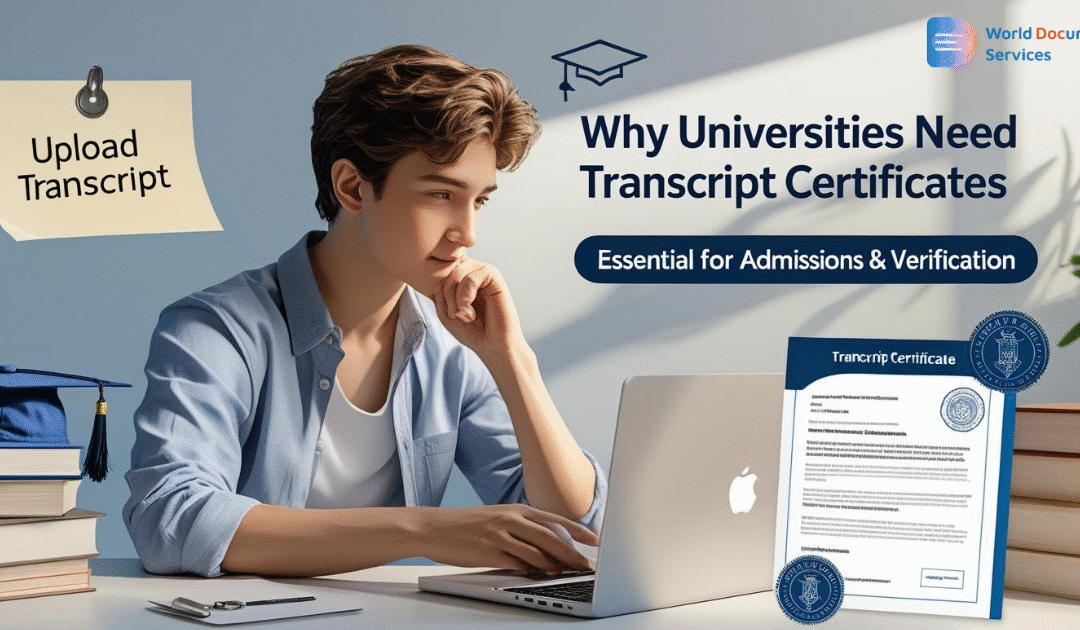
by World Document Services | Aug 6, 2025 | Transcripts Services
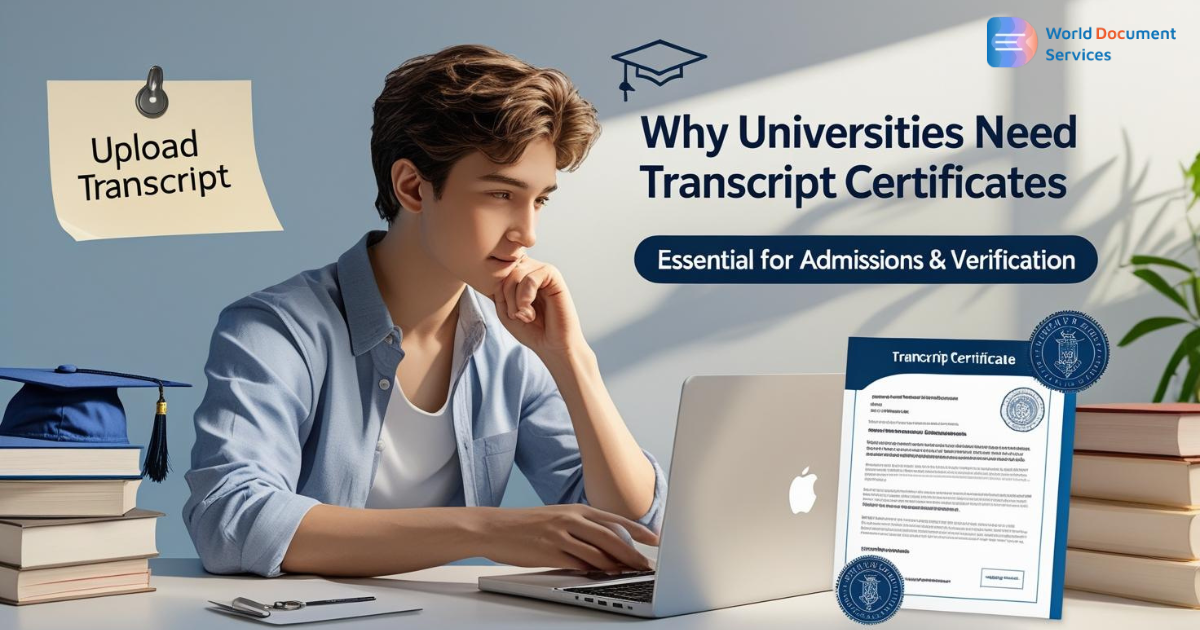
Universities request an academic transcript certificate while trying to get any further education, scholarships, or sometimes job opportunities in that particular establishment. The official record document gives out information about what courses you took, what grade you got, and what your academic standing is. Although sometimes it may seem just a formality, universities request a transcript for several fundamental reasons. Thus, understanding the reasons why they ask for it will help one navigate application processes better.
Need help with your University Transcript Certificate? Contact Us Now!
What Is a Transcript Certificate?
This is an official transcript certificate issued by your university or college. Here, all of your academic records in the form of a statement of courses completed, grades awarded, and credit hours earned through your program are presented. It is nothing at all like the mark sheet issued for each semester’s exams by your school or college. It summarizes all of your courses covered in different semesters.
Why Do Universities Require a Transcript Certificate?
1. Verification of Academic Qualifications
Universities require a transcript to verify an applicant’s qualifications. When one is applying for admission into a particular program, the institution has to confirm whether the applicant meets the requirements specified. The transcript details the courses that one has undertaken and the grades he or she has attained; thus, one will be academically qualified to attend the applied program.
2. Assessment of Academic Rigor
Apart from grades, the transcript also reflects the level of academic challenge of the studies that an applicant has undertaken. From this, the university will then be able to determine if the applicant is ready for advanced studies. For example, if you are applying for a graduate program in biology, the university will check if you have undertaken foundational courses in biology, chemistry, and other related fields.
3. Transfer Credits and Advanced Standing
If you are transferring from another institution, a transcript is necessary to determine which credits you have earned previously that can be transferred. In other words, with a transcript, the receiving institution can determine those courses you have already completed and which ones you still have to take. This would mean that unnecessary duplication of coursework is avoided, and education can proceed on schedule.
4. Educational Credential Assessment (ECA)
Transcripts are needed for ECA for international students or immigrants who apply for immigration. In fact, most countries require ECA for verification purposes; Canada, the U.S., and the U.K. do. A transcript will give the country a chance to judge whether your credentials meet the requirements of their education system, so that your qualification will be recognized elsewhere.
5. Scholarship and Financial Aid Applications
It incorporates your marks when applying for a scholarship or grant support. Routinely, while presenting the papers of your application for appraisal to a scholarship board, such a board examines your scholastic success. Considering how that record within your transcript falls, the scope for a possibility of a contender winning a scholarship or resource bound for future explorations increases.
6. Work verification
At times, he or she will want to see your transcripts, which are usually requested for a certain position, or even more often for those positions that require special academic skills. A resume would contain all qualifications on it; a transcript, however, makes available in detailed form all the courses taken and grades received. In fields such as law, health care, or engineering, proof that you actually have the necessary educational credentials to do so can be obtained by using your transcript in seeking employment.
7. Proof of Graduation
A transcript also serves as proof of completion of a degree. A degree certificate or diploma will only state that you have graduated; however, a transcript gives full details of your academic history, grades, and courses completed. Information is vital while filling out job application forms, further study, or immigrating, since the account will cover the full record of the background.
How to Get a Transcript Certificate
Usually, the process of getting a transcript certificate is as follows:
- Request the Transcript: Inquire from your registrar or academic department within your university for your transcript. Most universities have an online portal where you can submit requests for transcripts, although some may require it to be via email or in person.
- For all the required documents, it may involve proof of graduation, payment for the transcript, or the student ID.
- Pay for the fees; most universities normally have a fee attached to the issuance of the transcripts, though this usually varies with the number of copies ordered and the method of delivery.
- Wait for Processing: In weeks or days after submitting your request, the university gets your transcript processed from their backend.
- Get Your Transcript: You can get it by post or collect it in person, and most universities are now providing digital copies to make sure it reaches you quickly.
Conclusion
A transcript certificate is one of the most important documents that universities use to verify your academic credentials. Whether for further education, transfer credits, scholarships, or employment, transcripts provide a comprehensive record of your academic history and performance. This would help understand why universities need them and how to obtain them in order to successfully process an application. Be it further studies, scholarships, or employment, your transcript becomes a critical document to be included while representing your academic record precisely and appropriately.
Download the World Document Services App.
You may enjoy a hassle-free experience by downloading our mobile app from either the App Store or the Play Store. It works with both iOS and Android devices.
FAQs
Q: What is the difference between a transcript certificate and a mark sheet?
A: A transcript certificate is an overall record of the courses taken and grades achieved throughout your academic period. A mark sheet generally contains the results of an examination conducted in one semester.
Q: How do I apply for my transcript through an online process?
A: You will find online sites where you can ask for, at most, universities for the transcript of the classes. Most of the time, you will be able to request, pay, and collect the transcript electronically.
Q: How long does it take to get a transcript certificate?
A: The time taken in processing the transcripts varies from one university to another, taking sometimes a few days and other times a few weeks, depending on the workload of the university.
Q: Do I have to pay to get a transcript certificate?
A: Most universities charge a fee to issue the transcript. The transcript fees are chargeable based on the number of copies and delivery.
Q: Can I use my transcript for a job application?
A: Yes, employers, especially in specialized fields, may request a transcript to verify your academic qualifications.
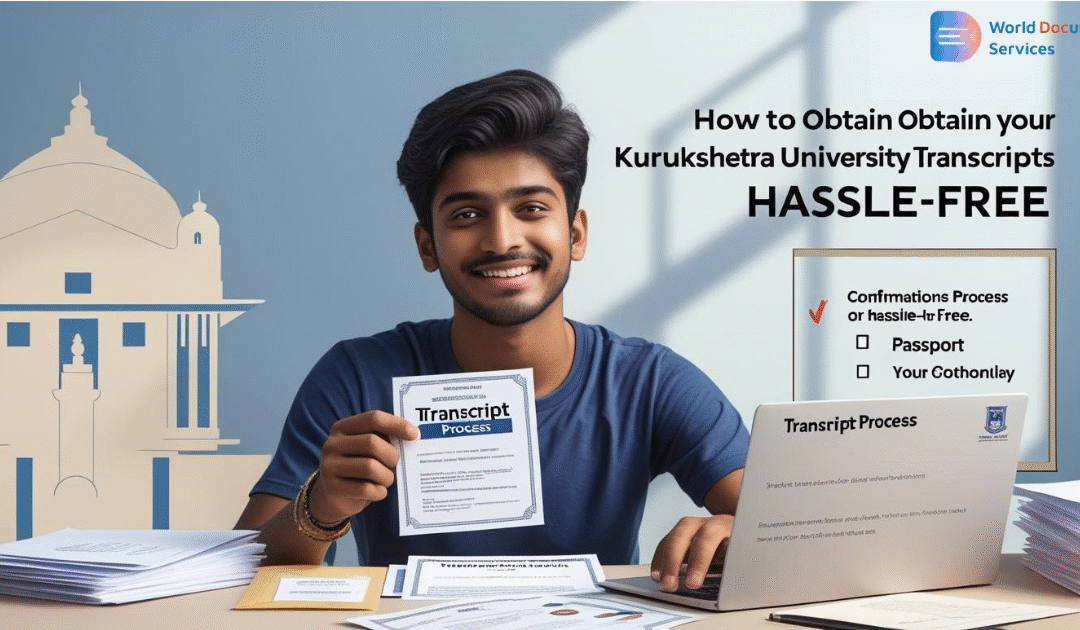
by World Document Services | Aug 5, 2025 | Most Viewed, Transcripts from University
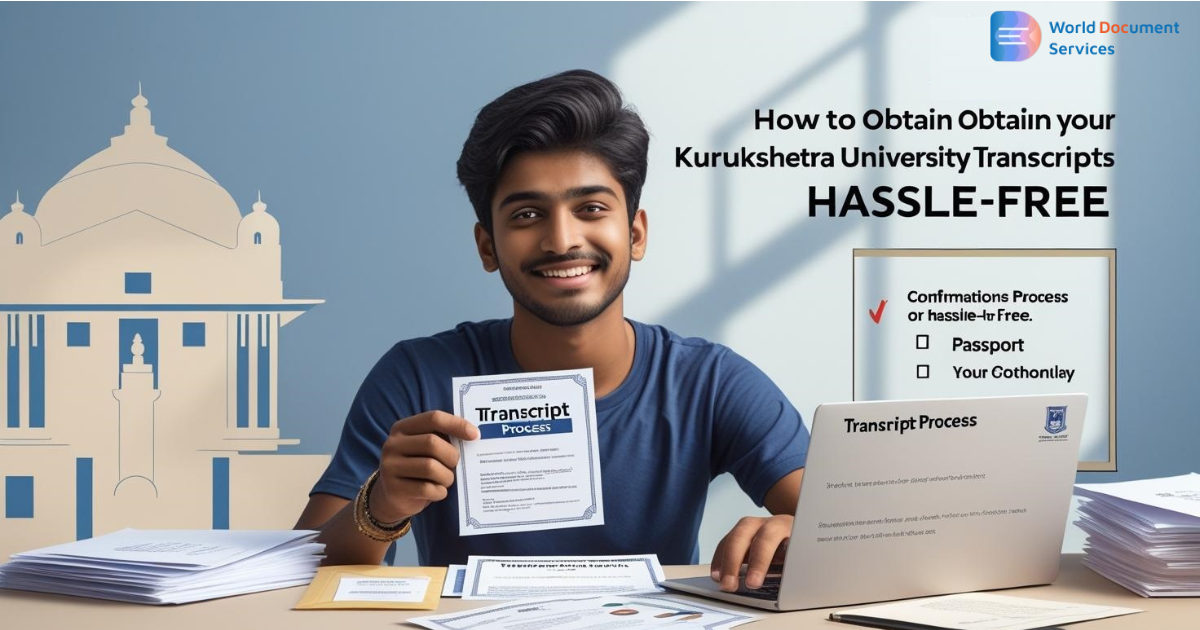
If you’re someone planning to study or move abroad and are an alumnus of Kurukshetra University, obtaining your Kurukshetra University transcripts becomes an essential step. These academic transcripts are very important for ECA, i.e., educational credential assessment, and various other applications, whether it is your university application or your application to apply for a job. And if you ever find this to be a lengthy process, World Document Services is here to provide you with all the support you need and will ensure that your application stays on track.
Need help with your Kurukshetra University Transcripts? Contact Us Now!
What Are University Transcripts?
A university transcript is the same as an academic transcript, which is a compilation of the courses you completed, your grades and marks achieved, your degree conferred, and your date of graduation. It will only be issued by the university.
Transcripts are important for your credential evaluation if you are planning to study abroad. Get your credentials evaluated through the educational credentials assessment.
Why are transcripts important?
For opportunities that include immigration, higher studies, or employment, your academic transcript is essential. Evaluation bodies use them to verify your credentials and compare them to the standards. Submitting accurate and timely transcripts is vital to avoid delays in the applications.
Step-by-Step Guide to Obtaining Kurukshetra University Transcripts
1. Prepare Your Documents
Begin by gathering all of your documents. Also, ensure that the information provided in all documents is correct.
These documents include:
- Copies of all semester marksheets.
- Degree certificate.
- Valid ID proof (e.g., Aadhaar card or passport).
- Completed transcript application form (available on the university website).
2. Putting your application online
Kurukshetra University allows one to put their application online as well as offline. To apply for the transcript, follow the steps below.
- Visit the official Kurukshetra University website.
- Navigate to the “Examination” or “Student Services” section.
- Look for the transcript application portal and register your account.
- Complete the application form, upload your documents, and submit your request.
Online applications help you avoid delays and make the entire process easier than ever. Also, it allows you to track the status of the application.
3. Pay the Application Fees
After compilation and submission of your application, you need to pay the processing fees. The fees depend on the number of copies you need and the type of process you have selected. Payment options typically include:
- Online payment via net banking or UPI.
- Demand Draft (DD) payable to the Registrar, Kurukshetra University.
Tip: Ensure to keep a copy of the payment receipt as proof for future reference.
4. Follow Up
Once your application is submitted, follow up with the university’s examination department to ensure everything is on track and avoid the mishaps. You can do this via:
- Email communication with the university.
- Online application portal (if applicable).
- Calling the transcript office for updates.
How Can World Document Services Help?
Applying for Kurukshetra University transcripts may involve challenges such as unclear guidelines, no response from the university, dealing with delays, or ensuring accuracy in documentation. That’s where World Document Services can assist. They provide:
- Expert Guidance: ensuring that your application meets all the university’s requirements.
- End-to-End Support: From collecting your documents to submitting applications and following up with the university.
- Timely Delivery: They ensure your transcripts reach the desired destination, whether it’s your home address or directly to WES for ECA.
If you’re short on time or uncertain about any part of the process, their services can be a lifesaver.
Benefits of Applying Online
Applying for the transcript online is the best way to submit the application.
- Convenience: Submit applications from anywhere without visiting the university.
- Faster Turnaround: Online processes are often quicker than manual submissions.
- Tracking: Keep tabs on your application status with real-time updates.
Conclusion:
Obtaining your Kurukshetra University transcripts does not need to be a difficult task. Following the guidelines outlined above will allow you to easily obtain your academic documents by ensuring that the documents you submit are accurate. Remember that professional assistance, such as World Document Services, is always beneficial.
Download the World Document Services App.
You may enjoy a hassle-free experience by downloading our mobile app from either the App Store or the Play Store. It works with both iOS and Android devices.
Frequently Asked Questions
Q: How long does it take to get transcripts from Kurukshetra University?
A: The process usually takes 15–30 working days, but it can vary based on the university workload.
Q: Can I apply for transcripts while living abroad?
A: Yes, you can apply online or authorize someone in India to handle the process for you.
Q: Are there additional fees for sending transcripts to WES or other evaluation bodies?
A: Yes, courier charges may apply if you want the transcripts delivered directly to WES or an international address.
Q: What happens if there’s an error in my transcript?
A: If you spot an error, contact the university’s transcript department immediately. Professional services like World Document Services can also guide you in resolving such issues.
Q: Why should I choose a professional service for transcripts?
A: Using a service like World Document Services saves time, ensures accuracy, and provides peace of mind by managing the entire process on your behalf.
Take the first step today—your academic transcript is the gateway to achieving your global aspirations!
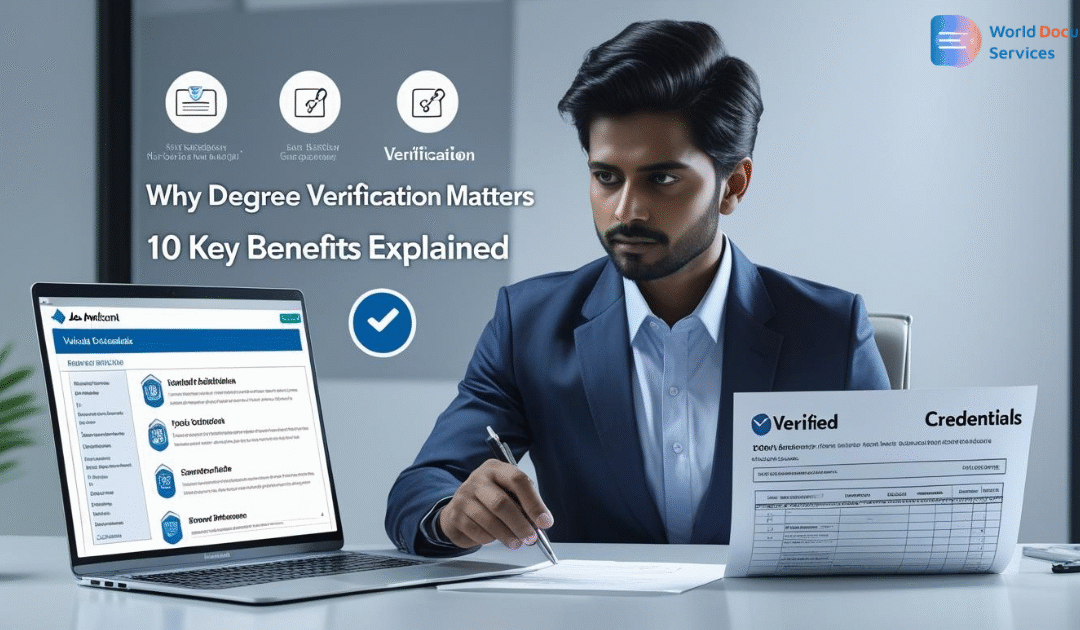
by World Document Services | Aug 4, 2025 | Document Verification
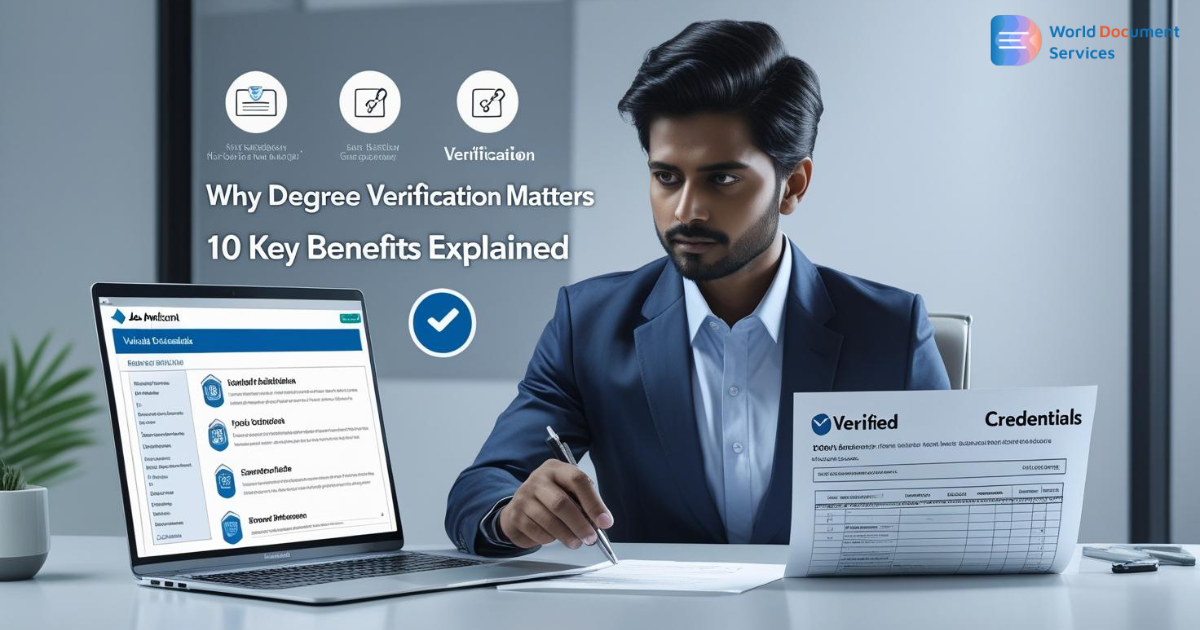
In this generation and era of professionalism, ensuring the reliability of potential employees has become a challenge. Organizations have their focus mostly on ensuring that the employees they hire are most qualified for the role and are reliable for the organization. University degree verification is an important step in ensuring that the organization doesn’t hire any underqualified candidate who can affect the reputation of the organization or is a resource of no use. This step protects the organization from fraudulent claims while also ensuring the integrity of the recruitment process.
Need help with your University Degree Verification? Contact Us Now!
1. Confirms the authenticity of educational credentials
For the matter of the accuracy of degree certificates to evaluate an applicant’s qualification. Fake documents or unverified documents are not very uncommon, and verifying one’s credentials ensures that they have genuinely earned their degrees and certificates. This step helps in hiring individuals with accurate qualifications and ones that organizations can rely on.
2. Reduces the risk of fraudulent hiring
Fake educational credentials have become very common in recent days. As there are rising cases of fake degrees and certificates, it becomes difficult for one to just rely on documents that are available. An effective educational verification process helps employers to hire better employees, and with it, they can authenticate the documents as per the requirement without compromising the hiring process.
3. Ensures compliance with legal requirements
Industries like healthcare, education, and engineering have very strict guidelines and compliance regarding the qualifications of any individual wanting to work abroad. Verifying the academic credentials helps organizations understand and check whether the applicant meets certain criteria, which are required for the job to be done.
4. Enhances workplace productivity
Hiring candidates with authentic qualifications helps to understand and ensure the skills required to perform the tasks being assigned. This contributes to fostering a healthy competition, which also enhances the overall productivity and efficacy of the workplace as a whole.
5. Protects the company’s reputation
Employees are the representatives of their employers and the organization they work for. Hiring employees with no solid background or without proper university degree verification can lead to scandals or affect the company’s credibility.
6. Helps Identify the Best Fit for the Job
The educational verification process is not just about filtering the candidates with unauthentic credentials, but also ensuring that the candidate who possesses the specific educational qualifications gets the role. This ensures that the job is aligned with the skills the job requires and the skills individuals hold. Making sure the one with authentic skills and fair means gets through the jobs.
7. Saves Time and Resources in the Long Run
It does seem time-consuming to get your educational credentials verified, but it saves the organization’s resources in the long term. Verifying the educational credentials and hiring people may seem like a challenging task, but replacing the resources with false information is even more challenging and costly. Hiring people based on their qualifications and verified credentials can prevent any such errors upfront, minimize employee turnover, and balance the cost associated.
8. Builds trust among employees and stakeholders
A company that hires through transparent means, including academic credential verifications, has built trust among its employees, clients, and stakeholders. This trust is important in a certain way, creating better coordination and a reliable work environment.
9. Prepares for International Hiring Standards
Hiring across the globe is a trend and isn’t restricted to just one place now, thanks to globalization. This makes degree certification even more important, as international documents might be difficult to validate without a structured verification process.
10. Mitigates Financial and Operational Risks
Loss of resources is a financial loss as well. In certain cases, it has been seen that people who are underqualified lead to financial loss, which can be in any form, such as project delays or operational mishaps. Specifically in industries like healthcare, inadequate knowledge can lead to severely unacceptable outcomes. Hence, university degree verification eliminates such risks by ensuring that the employees being hired must carry the required qualifications.
How the Education Verification Process Works
1. Candidate Consent
The process begins when the employer updates the candidate about the educational verification process and seeks approval to verify their credentials.
2. Document Collection
The collection of documents is the second step, which is either performed by the employer or the agency. They require copies of the degree certificate, transcripts, and other supporting documents.
3. Contacting Educational Institutions
To verify the documents and certificates, you must reach out to the respective educational institution to confirm the authenticity of the documents.
4. Verification Report
Once the entire verification is done, a report is generated mentioning all the data collected, and then it is either sent to the employer or used by them to make the final call.
Challenges in University Degree Verification
Academic credential verification is of the utmost importance; it comes with its own set of challenges. Which are as mentioned:.
Verifying educational credentials can be time-consuming, especially when dealing with international qualifications.
Some universities may be slow to respond to verification requests, which can cause delays.
The verification process may require the intervention of a third party and hence can add to the cost of verification as well as to the cost of recruitment.
Conclusion
University degree verification is an important part of today’s recruitment process. It is simply unavoidable, as it safeguards both employees and employers in their best interests. Majorly for the employers, it helps to avoid potential fraud, ensures compliance with industry standards, and protects their reputation, but also builds a foundation of trust for long-term success.
In a world where educational credentials are increasingly called into doubt, authentication is no longer optional but paramount when it comes to the degree certificate.
To obtain any assistance in regard to your educational document verification or to address any other questions regarding the same, you can contact World Document Services.
To get any support in your educational document verification or to resolve any queries related to the same, you can reach out to World Document Services. We are experts in the area of document procurement as well as getting it verified.
Download the World Document Services App.
You may enjoy a hassle-free experience by downloading our mobile app from either the App Store or the Play Store. It works with both iOS and Android devices.
FAQs:
Q: What is university degree verification?
A: University degree verification is a process of verifying the credentials and authenticity of the degrees awarded by the issuing institution to a candidate.
Q: Is international qualification degree verification possible?
A: Yes, there are many third-party verification agencies that can verify international educational qualifications to the requirements of the employer.
Q: How long does the education verification process take?
A: The time taken would again vary with the responsiveness of the educational institute and the complexity of the candidate’s qualification.
Q: Which challenges do employers face regarding the verification of degree certificates?
A: Most common challenges include long waiting times from unresponsive institutes, problems in checking old qualifications, and extra charges when a third party is opted to verify the degree certificate.
Q: How do candidates ensure smooth verification?
A: They must provide correct information, be available with their degree certificates at the time of request, and grant permission quickly when sought.
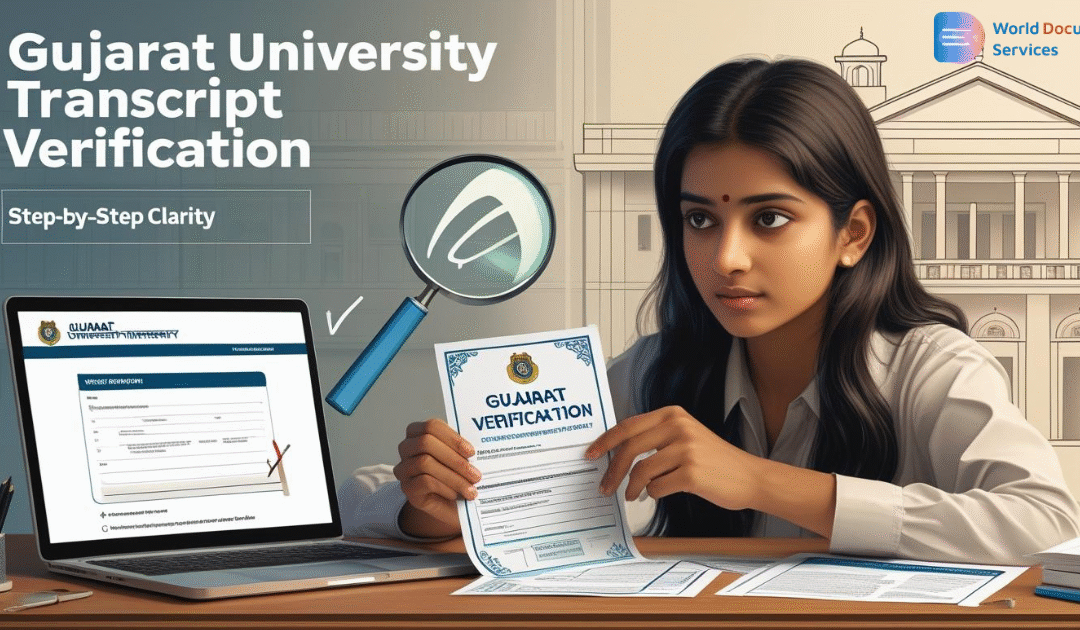
by World Document Services | Jul 30, 2025 | Transcripts from University
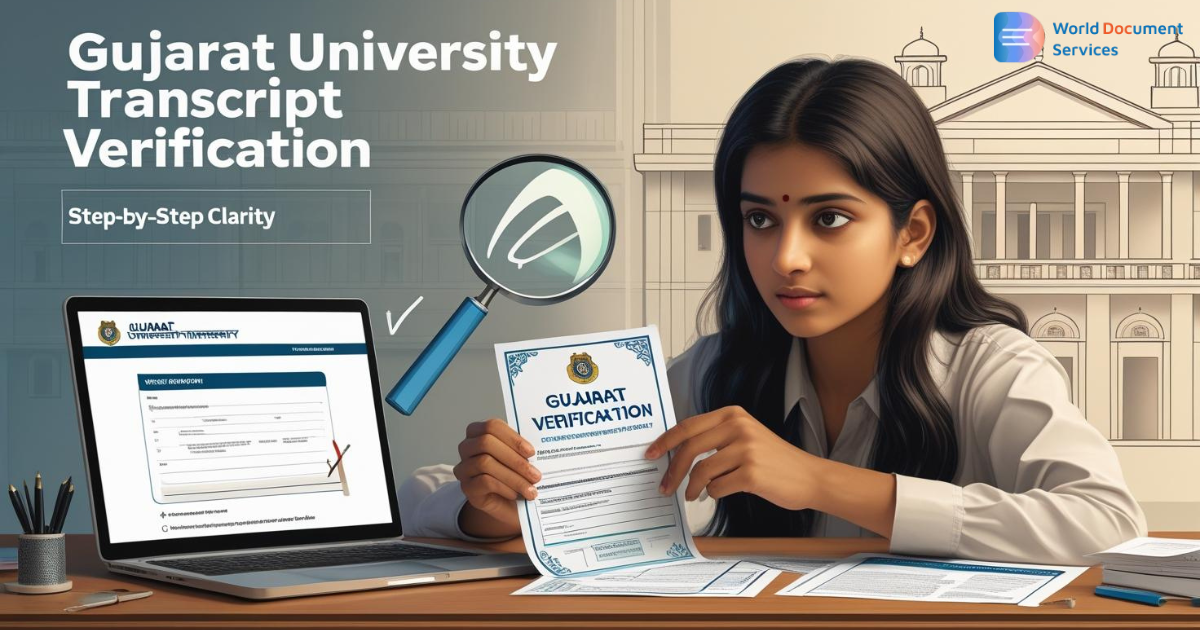
Getting your Transcript from Gujarat University can be a lengthy and overwhelming process if you are an individual who is planning to study abroad, applying for a job there, or planning to immigrate abroad. In this blog, we will be learning how to simply obtain, verify, and submit your academic transcript for your job application, study abroad plan, or immigration.
Need help with your Gujarat University Transcripts? Contact Us Now!
What is a university transcript?
A university transcript is the same as an academic transcript, which is a compilation of the courses you completed, your grades and marks achieved, your degree conferred, and your date of graduation. It is to be issued by the university only.
Transcripts are important for your credential evaluation if you are planning to study abroad. Get your credentials evaluated through the educational credentials assessment.
Why do you need a Gujarat University transcript?
If you are an alumnus from Gujarat University and want to pursue your career abroad, you must have your transcripts ready for evaluation by credential evaluation bodies.
Steps to apply for a Gujarat University transcript online:
The application process for applying for a transcript online is quite simple:
- Visit the Gujarat University Portal.
- Fill up the form, entering all your required information, which includes your personal information, the course you attended and completed, and your year of graduation.
- Upload Required Documents
You need to provide:
– Scanned copies of all semester mark sheets.
– Degree certificate.
– Government-issued ID (Aadhar card, passport, etc.).
- Pay the required fees.
- Submit your application and keep the receipt for tracking purposes.
Process time:
The standard time is about 25-30 working days. However, it can take longer depending on the university’s working days and government-declared holidays.
Verification process for educational credential assessment:
If you need your transcript to be assessed by Educational Credential Assessment (ECA) or World Education Service (WES), you must follow additional verification steps:
- Get your documents verified by paying extra fees.
- A sealed envelope is required, as most of the evaluation bodies accept the documents in sealed and signed envelopes, directly from the university.
Common pitfalls one might face:
There are some common mistakes any individual may make while applying their transcript; please note that a small mistake can delay your entire process.
- Not reviewing your transcript can make you ignore the slightest mistake, and that eventually can create a problem for the future. Review your documents as you receive a copy of them.
- Incomplete documentation can make your entire process suffer; hence, create a checklist for all the documents and then follow it as well to ensure the entire documentation is complete.
- Due to delays caused by regional strikes and riots, processing may take longer during such incidents, and being aware of the same can help you avoid the delays.
Tips for a Smooth Application:
- Starting early can be the best way to avoid any delay and to miss any deadline, especially when your transcript requirement is very time-sensitive.
- Keeping your documents ready, along with their copies. Documents such as marksheets, degree certificates, and application receipts.
- Provide accurate information and ensure all the details match the original documents provided by the university.
Conclusion
Getting your transcript from Gujarat University can be a complex process and time-consuming activity, especially when you are moving ahead with a time-sensitive activity that has a step of credentialing or submitting sealed documents to bodies like WES. However, with proper planning and accurate documentation, one can ensure a smooth process.
At World Document Services, we understand the challenges involved and make your application for a Gujarat University transcript easy by managing your timeline. Whether it is a strict time schedule, verification of your document, or ensuring sealed sign envelopes reach credential evaluation bodies. Let us take the stress out of the process so you can focus on achieving your goals abroad.
Reach out to us today, and let’s get started!
Download the World Document Services App
You may enjoy a hassle-free experience by downloading our mobile app from either the App Store or the Play Store. It works with both iOS and Android devices.
FAQs:
Q: How long does it take to get a transcript from Gujarat University?
A: It usually takes about 15-30 working days; however, the timeline may vary depending on the nature of the application and government-approved holidays.
Q: What documents are required to apply for a transcript?
A: To apply for a transcript, you’ll typically need an application form, ID proof, mark sheets, a degree certificate, and a fee receipt.
Q: Can someone else collect my transcript on my behalf?
A: Yes, third parties like World Document Services can do that, but they must have a signed authorization letter and IDs (both yours and theirs).
Q: What should I do if there is an error on my transcript?
A: Contact the Gujarat University examination department with proof of the correct information for a correction request.

by World Document Services | Jul 29, 2025 | Transcripts Services
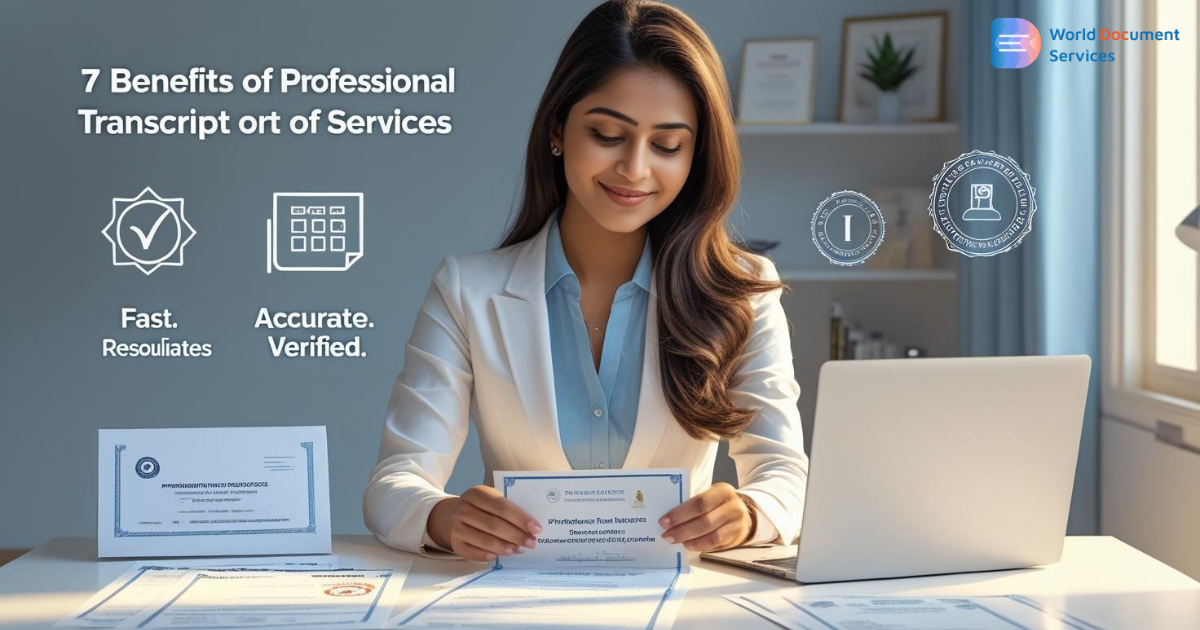
Nowadays, practically everyone plans to study abroad, migrate, or seek a job. It’s a good idea to keep your academic transcript close at hand. Keeping your transcript ready helps you avoid delays and mishaps. Many people attempt to apply for transcripts on their own, but they often encounter various issues and soon realize the value of having a professional guide them through the process. Using professional transcript service providers, just like World Document Services, can make your entire experience smooth and efficient.
In this blog, we will understand why having an expert by your side is crucial:
Need help with your Professional Transcript Service? Contact Us Now!
1. Accuracy and attention to details
Academic transcripts, which consist of written records of your academic career, provide you with a reputation wherever you intend to go. Any error could cost you the chance. You may avoid this delay by employing a professional transcript service provider, who will carefully review the records because they are specialists. They are aware of the application’s format requirements.
In addition, they ensure that:
- Checking the information before submitting.
- Whether or not the transcript follows the necessary format.
2. Time Saving and Convenient
Getting a transcript and verifying your degree certificates can be a lengthy and time-consuming process. There are many instances in which you or someone else on your behalf will be required to make multiple trips to the university. Along with multiple follow-ups with officials to know the status of the document. It might seem like an easy process, but it requires a lot of work to be done.
Having the guidance of a professional transcript service streamlines the entire process and can save some time for you, in which you can avoid the stress and focus on future endeavors.
3. Comprehensive document verification services
Your transcript is just not enough when applying. Universities, employers, and immigration bodies often require verified copies of your documents. This is where document verification services come into play. They not only help in obtaining your transcript but also help you to verify all your documents from universities and other institutes, from wherever the authentication is needed.
These transcript service providers typically have established relationships with educational institutions and credential review bodies, ensuring a simpler process and familiarity with credential evaluation body criteria.
4. Access to Global Academic Transcript Services
If you plan to study or work abroad, your transcripts must meet international standards. Professional academic transcript services can help you comply with the requirements of universities and employers globally.
Advantages of Global Services include:
- Assisting with Non-English language translations if needed
- Expertise in handling international applications and formatting.
With expertise, you can avoid the coming pitfalls in your pathway and can meet your expectations required for your application.
5. Customized transcript solutions:
Every individual and university has its own unique set of needs and standards. Some may need a simple copy, while others may need digital copies. Some will require a single copy; therefore, transcript services provide unique solutions for each of us to satisfy our needs.
Features of customized services:
- Flexibility in the options of digital online copy called e-transcript or a traditional physical copy of transcript.
- Connections and ability to send documents directly to university and through university as well to evaluation bodies.
Tailored services as per your requirement.
- By opting for the professional transcript services, like World Document Services, you get your requirements fulfilled at ease, and being a professional, you don’t have to meet the deadlines as well.
6. Compliance with Institution-specific Requirements
Each individual and university has its own set of requirements and norms. Certain institutions might be required to have their own set of transcript requirements, including format and seals. Some may need the submission of details and data in digital format, as well as college attestations, before the institution begins the verification procedure. A typical mistake in applications can lead to compliance failure, and failing to fulfill the criteria might cause the entire process to be delayed. Professional transcript services are generally well-versed in compliance.
How professionals can help:
- Easy process as they already have advanced knowledge of the process.
- Proper handling of the document or submissions of the document.
- Reduced chances of delays.
Complaints are essential when handling academic transcript devices because they make it simpler for you to understand and handle these kinds of circumstances.
7. Cost-Effective and Reliable Services
While some people think they can get their transcripts on their own without getting help from any transcript service providers and can save them money, one mistake can make you follow the entire process overall again, taking your entire time and costing the entire process overall again. Professional transcription services offer cost-efficient alternatives to every process they carry.
Economic Benefits:
- Reduces unexpected costs.
- No hidden charges and expedite processes.
- A high success rate saves your time.
Conclusion
When it comes to accuracy, reliability, and timely delivery, academic transcripts are essential. By choosing professional transcript services, you save your necessary time, avoid unnecessary worries and have the confidence that your academic transcript request is being handled by the experts
Professional services cover everything from verifying the documents to customized transcript solutions, ensuring that your documents are correct, verified, and prepared to move ahead. Rely on credible sources like World Document Services for reliable and efficient transcript services that ensure that your academic future isn’t left to chance.
Download the World Document Services App
You may enjoy a hassle-free experience by downloading our mobile app from either the App Store or the Play Store. It works with both iOS and Android devices.
FAQs
Q: Why is accuracy so important in academic transcript services?
A: Accuracy in academic transcript services is crucial because even a small mistake can delay university applications, affect job opportunities, or lead to incorrect evaluations. Accurate transcripts ensure that your academic records are correct, verified, and accepted by institutions, giving you a strong foundation for future plans.
Q: How do professional academic transcript services differ from DIY options?
A: Professional transcript services offer expert handling, document verification, and faster processing. DIY options can be time-consuming and risk errors. With a professional service, you get accurate, verified transcripts without the hassle.
Q: Are professional transcript services cost-effective?
A: Yes, they provide cost-efficient alternatives, reducing unexpected costs and avoiding the need for reprocessing due to errors.
Q: What are e-transcripts, and how are they different from physical transcripts?
A: E-transcripts are digital versions of your academic records, which can be sent electronically to universities or evaluation bodies, while physical transcripts are paper copies.











 Call Us
Call Us Mail Us
Mail Us WhatsApp
WhatsApp
